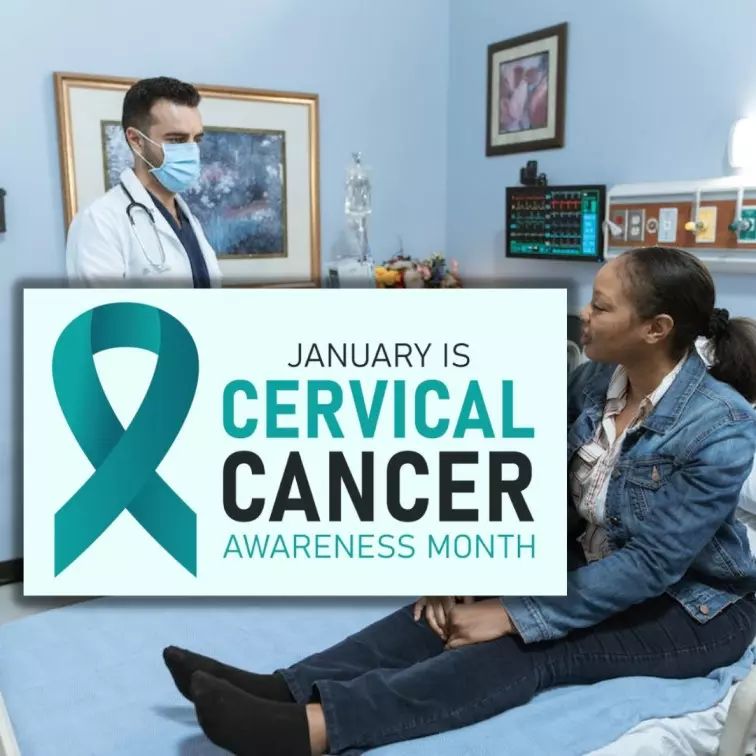Cervical Cancer Awareness Month: Know Causes & Prevention Of The Disease That Affects Almost 6 Lakh Women Annually
Writer: Navneet Nishant
I am a Media Student currently pursuing Master's in Mass Communication From Central University Of Jharkhand, I have done my previous internship In Jharkhand state livelihood promotion society as KMC intern.
India, 27 Jan 2023 5:02 PM GMT
Editor : Jayali Wavhal |
She writes about gender issues, human interest, and environment.
Creatives : Navneet Nishant
I am a Media Student currently pursuing Master's in Mass Communication From Central University Of Jharkhand, I have done my previous internship In Jharkhand state livelihood promotion society as KMC intern.
Globally, cervical cancer affects 5,70,000 women annually, which is about 8.6 per cent of all cancers. Cervical cancer is by far the most common HPV-related disease and infections may spread from person to person easily, primarily through intimate skin-to-skin contact.
Across the world, January is observed as the month to raise awareness about cervical cancer. Since cervical cancer is one of the most aggressive types of cancer that affects women, a greater understanding of its warning signs, symptoms, and available preventative measures is a must. Globally, cervical cancer affects 5,70,000 women annually, which is about 8.6 per cent of all cancers.
Causes Of Cervical Cancer
Cervical cancer is by far the most common HPV-related disease. As per World Health Organisation (WHO), 95 per cent of cervical cancer in the world is caused by HPV infection. According to the doctor, HPV infections may spread from person to person easily, primarily through intimate skin-to-skin contact. Additionally, non-penetrative sexual behaviour has the potential to spread it. The doctor claims that using condoms during sexual activity does not protect against HPV infection.
Everybody has a chance of contracting HPV at some point in their lives. Most of the time, these infections are minor and heal themselves naturally. However, persistent genital infections with specific strains of HPV viruses can cause pre-cancer and genital-regional malignancies in both men and women, a report by The Indian Express states.
The cause factors for cervical cancer are early sexual initiation (especially before the age of 25), several sexual partners, multiple pregnancies, smoking, oral contraceptive use, and lack of male partner circumcision. Almost all cases of female cervical cancer have been linked to prior HPV infection, which may occur 15-20 years after an undiscovered infection. HPV infection is a known factor for later development of genital cancers. In addition to unsightly genital warts, HPV infection can also cause them.
Prevention Of Cervical Cancer
With an anticipated 604 000 new occurrences in 2020, cervical cancer is the fourth most common cancer in women worldwide. About 90 per cent of the predicted 342,000 deaths from cervical cancer in 2020 occur in low and middle-income nations, stated World Health Organization.
According to doctors, cervical cancer is a disease which can be prevented, and early detection and treatment are both achievable. However, there is relatively little information available on Indian women's screening practices for cervical cancer.
To prevent the disease, vaccines are necessary, and effective screening is required to find any early signs of cancer. Due to a weakened immune response, natural HPV infection does not protect against other viral infections. There are no reliable screening techniques for the early diagnosis of these cancers.
Vaccinations protect against the common viral strains that cause genital warts and cancer. Worldwide licensing allows for these vaccines, which are given to men and women in numerous nations.
The nine-valent vaccine can be given to boys and girls of up to 15 and 25 years of age, respectively. It protects against two strains of genital warts and seven significant strains known to cause cancer. The experts advise three doses, the second of which should be administered two months after the first and the third after six months, noting that there is no need to restart the programme if the subsequent doses are delayed.
Only females between the ages of nine and forty-five can receive the four-valent vaccine, which protects against two strains of cancer and two strains of genital warts. If it is started before age 15, just two doses are needed. Women who have never received this vaccination can get it immediately after giving birth and even while nursing. Male vaccination is as essential because it can expose females to HPV. The only vaccine that can currently prevent cancer is the HPV vaccine.
Also Read: My Story: 'Cancer Taught Me To Cherish Life And Its Simple Joys That We All Take For Granted'
 All section
All section















